Latest DePIN Funding News

2 months ago
FTX's Secret Liquidation of 3AC Assets Revealed
Recent court documents have unveiled that FTX liquidated $1.53 billion in assets belonging to Three Arrows Capital (3AC) just two weeks prior to the hedge fund's collapse in 2022. This revelation contradicts earlier narratives that attributed 3AC's downfall solely to market conditions. Once valued at over $10 billion, 3AC faced a significant crisis after a series of leveraged trades went awry, leading to its eventual bankruptcy amid the May 2022 crypto crash, which saw Bitcoin plummet to $16,000. The hedge fund had borrowed extensively from over 20 large institutions before its collapse.
The newly discovered evidence indicates that 3AC was unaware of FTX's liquidation actions due to the latter's own bankruptcy proceedings. As a result, 3AC has sought to increase its claim against FTX from $120 million to the full $1.53 billion, asserting that it only recently became aware of the liquidations. A court has ruled that 3AC acted in good faith, allowing it to pursue this larger claim in the ongoing bankruptcy case of FTX. Meanwhile, a British Virgin Islands court has frozen $1.14 billion in assets belonging to 3AC co-founders Kyle Davies and Su Zhu, as Teneo estimates that creditors are still owed approximately $3.3 billion following the hedge fund's collapse.
Despite the significant sum involved, analysts suggest that even with the additional $1.53 billion, 3AC might not have been able to avert bankruptcy. Nicolai Sondergaard, a research analyst at Nansen, indicated that the hedge fund likely would not have met creditor claims or debt repayments even with the liquidated assets. The situation has drawn attention from industry figures, including Binance co-founder Changpeng Zhao, who expressed curiosity about FTX's potential involvement in the broader market turmoil during that period. The fallout from 3AC's collapse continues to reverberate through the crypto landscape, raising questions about the interconnectedness of various entities in the market.

2 months ago
Coldware (COLD): A Promising Alternative Amid Ethereum's Challenges
The cryptocurrency market is currently experiencing notable fluctuations, particularly affecting major players like Ethereum (ETH). Ethereum has been under bearish pressure, struggling to maintain its price above critical support levels. As investors seek alternatives to diversify their portfolios, emerging projects such as Coldware (COLD) are gaining traction. Coldware aims to create a decentralized Web3 ecosystem that addresses scalability and efficiency challenges that Ethereum is still grappling with. This shift in focus towards innovative projects indicates a potential change in investor sentiment as they look for fresh opportunities amidst Ethereum's struggles.
Coldware (COLD) is positioned for significant growth, especially as its presale numbers surge amidst Ethereum's price corrections. The project offers a user-friendly platform that enhances interaction with decentralized applications, potentially outpacing Ethereum in usability. With a target price of $5, Coldware is attracting attention from investors disillusioned by Ethereum's ongoing issues with network congestion and scalability. As Ethereum's value continues to decline, Coldware's focus on practical applications and real-world use cases gives it a competitive edge, making it a promising alternative in the current market landscape.
While Ethereum's long-term outlook remains optimistic due to upcoming upgrades like Ethereum 2.0, its short-term challenges could hinder price recovery. The recent price drop has raised concerns among investors, with predictions suggesting further declines. In contrast, Coldware (COLD) is leveraging Ethereum's struggles to present itself as a viable investment opportunity. As the decentralized Web3 ecosystem evolves, Coldware's innovative approach may attract both retail and institutional investors, positioning it as a potential major player in the altcoin market in the coming years.

2 months ago
Congress Eases DeFi Reporting Obligations, Privacy Concerns Persist
The decentralized finance (DeFi) sector is experiencing a significant shift as the U.S. Congress has voted to nullify a controversial IRS rule that mandated DeFi protocols to report gross proceeds from crypto sales and taxpayer information. This rule, issued in December 2024 and set to take effect in 2027, was deemed burdensome by industry lobby groups and was seen as an overreach of the IRS's authority. The bipartisan vote in the House of Representatives has garnered support from the White House, with President Donald Trump poised to sign the bill into law. However, the DeFi community remains concerned about finding a balance between user privacy and regulatory compliance moving forward.
Privacy issues were central to the objections raised by the crypto industry against the IRS rule. Advocates like Marta Belcher, president of the Filecoin Foundation, emphasized the importance of user anonymity in transactions, akin to cash dealings. The Blockchain Association also criticized the rule as an infringement on privacy rights, warning that it could push DeFi operations offshore. While the rule has been halted, there is still a lack of established privacy guidelines, which industry leaders like Vivek Raman argue are essential for the sector's progression. He stressed the need for clear frameworks that allow for privacy while adhering to Know Your Customer and Anti-Money Laundering requirements.
As the crypto industry grapples with the dual demands of user privacy and regulatory oversight, the question of how to effectively regulate DeFi remains complex. The decentralized nature of these protocols complicates accountability, making it challenging for regulators to enforce traditional financial rules. Despite these hurdles, there is optimism that solutions such as zero-knowledge proofs could facilitate compliance without compromising user privacy. Meanwhile, the Senate Banking Committee's recent approval of the GENIUS Act, a stablecoin bill, signals progress towards a more structured regulatory environment. However, comprehensive regulations for DeFi may still be a distant goal, as ongoing studies aim to assess the risks and benefits associated with these innovative financial systems.

2 months ago
Coinbase Boosts Maple Syrup and Aethir with New Listings
In a significant development within the cryptocurrency market, two Ethereum (ETH)-based altcoins, Maple Syrup (SYRUP) and Aethir (ATH), have experienced substantial price surges following their recent support from Coinbase, one of the largest crypto exchanges in the United States. Coinbase announced the addition of these tokens to its digital asset offerings via posts on the social media platform X. This announcement came shortly after the tokens were included in Coinbase's listing roadmap, which indicated forthcoming support and led to a nearly 40% price increase for both assets.
The price movements of SYRUP and ATH have been remarkable. SYRUP, a decentralized finance (DeFi) protocol that connects borrowers with lenders, saw its price rise from a low of $0.131 on March 12th to a peak of $0.173 within 24 hours, marking a gain of 28.7%. Similarly, Aethir, which focuses on decentralized cloud computing with high-performance GPU capabilities for AI and blockchain-based gaming, increased from $0.034 to $0.040, achieving a 14.4% gain in the same timeframe. These price rallies underscore the impact of Coinbase's endorsement on the market dynamics of these emerging tokens.
The growing interest in both Maple Syrup and Aethir reflects a broader trend in the cryptocurrency space, where decentralized finance and AI-driven solutions are gaining traction. As investors continue to seek opportunities in innovative blockchain projects, the support from major exchanges like Coinbase is likely to play a crucial role in driving adoption and market performance. However, potential investors are reminded to conduct thorough research and exercise caution, as the cryptocurrency market remains volatile and high-risk.
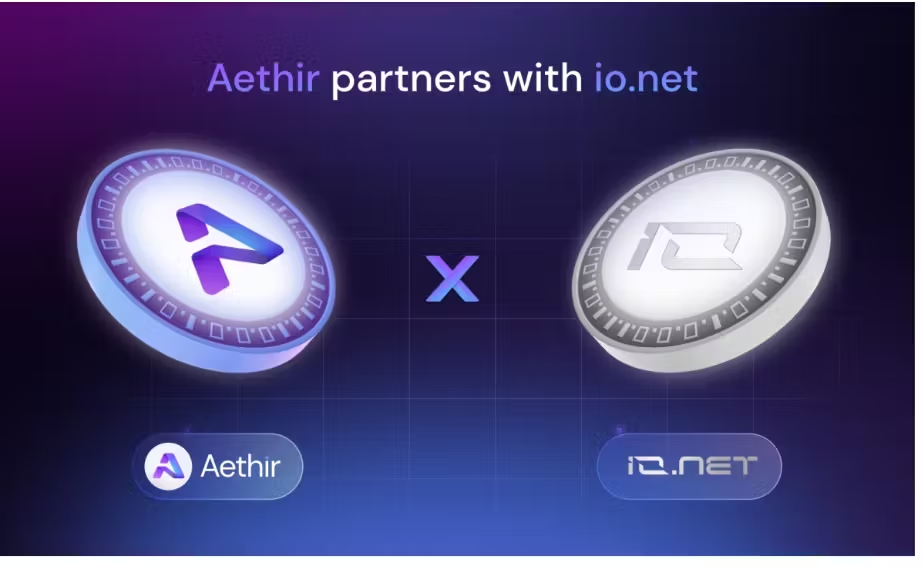
2 months ago
io.net and Aethir Collaborate to Enhance Decentralized GPU Computing
In a significant move for the decentralized computing landscape, io.net and Aethir have announced a strategic collaboration aimed at enhancing GPU access and performance for applications in AI, machine learning, and gaming. By integrating io.net's advanced virtualization technology with Aethir's enterprise-grade distributed GPU cloud, the partnership seeks to create a robust, low-latency, and cost-effective solution tailored for GPU-intensive workloads. This collaboration comes at a time when the demand for GPU computing is surging, with projections indicating that the market could quadruple in size by 2030.
The alliance between io.net and Aethir is designed to provide a highly scalable and efficient solution to meet the growing global demand for GPU resources. io.net’s cutting-edge virtualization and orchestration capabilities will enable AI and machine learning engineers to deploy Ray and Kubernetes clusters seamlessly across a network of over 600,000 decentralized GPUs and CPUs. Meanwhile, Aethir's distributed cloud infrastructure is set to deliver enterprise clients in the AI, machine learning, and gaming sectors with fast and scalable GPU cloud resources, leveraging a network of over 40,000 high-performance GPUs, including 3,000 NVIDIA H100s.
Under the terms of this collaboration, both companies will integrate their ecosystems to offer customers a seamless GPU computing experience across various workloads, including clustering and serverless inferencing. This reciprocal integration will allow io.net’s clustering solutions to be accessible on Aethir’s platform, providing enterprises with a diverse range of GPU-based computing options. Additionally, both companies plan to collaborate on marketing and community initiatives, further enhancing the overall ecosystem. As part of their partnership, an airdrop will distribute $50 million worth of tokens to community members of both platforms, marking a significant milestone in their joint mission to democratize high-performance compute access for all.
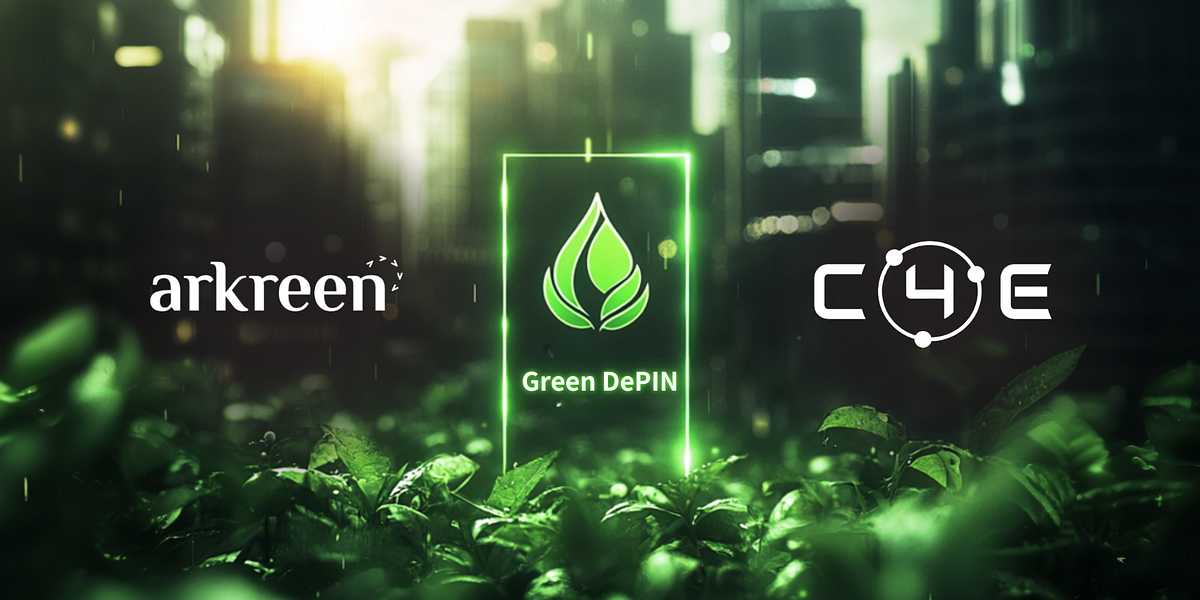
2 months ago
Arkreen Partners with C4E to Advance DePIN Energy Solutions
Arkreen has announced a strategic partnership with C4E, focusing on the DePIN Energy sector. This collaboration combines Arkreen's expertise in decentralized renewable energy networks with C4E's advancements in AI-driven energy solutions. The partnership aims to enhance the Green DePIN Initiative, promoting a sustainable on-chain economy globally. C4E is recognized for its pioneering efforts in Web3 technology and green energy innovations, particularly in electric vehicle (EV) charging and decentralized energy management. Meanwhile, Arkreen utilizes blockchain and IoT technologies to connect distributed renewable energy resources, contributing to a carbon-neutral future.
The alliance between Arkreen and C4E represents a significant fusion of technology and vision, driven by a mutual commitment to sustainability. Both organizations are set to explore how DePIN technology can improve the accessibility and efficiency of green energy solutions. This partnership is expected to lead to innovative approaches that will not only benefit the partners but also empower communities worldwide with smarter and greener energy options.
As Arkreen and C4E embark on this journey together, they promise to deliver exciting updates and advancements in the DePIN Energy space. The collaboration is positioned to make a meaningful impact on the renewable energy landscape, fostering a more sustainable future through the integration of decentralized technologies and AI. Stakeholders and communities can look forward to the positive changes that this partnership will bring in the realm of green energy solutions.
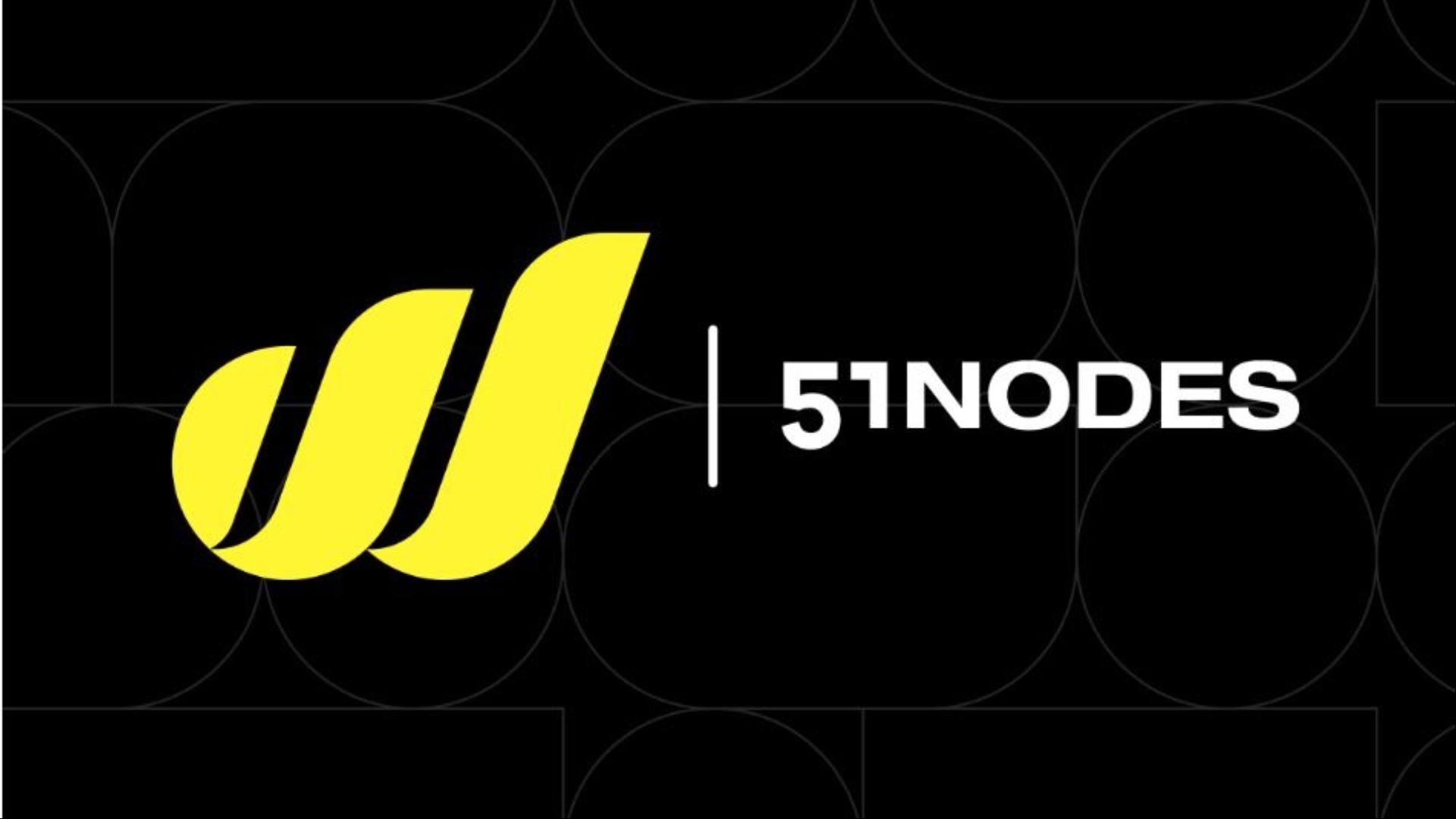
2 months ago
51nodes and World Mobile Collaborate to Advance Blockchain Integration in Industrial Applications
In a significant move towards integrating blockchain technology into real-world applications, 51nodes, a prominent German blockchain integration specialist, is partnering with World Mobile to leverage its advanced Layer-3 infrastructure on Base. This collaboration aims to deploy decentralized physical infrastructure solutions and blockchain-powered applications, particularly focusing on data-based tokenized assets within Europe’s industrial sector. A $5 million grant program will support 50 projects, each receiving up to $100,000, to explore various decentralized infrastructure use cases, with major European corporations playing a crucial role in shaping these initiatives.
The initiative emphasizes the importance of tokenizing real-world assets and utilizing decentralized physical infrastructure networks (DePIN) to enhance security and streamline the commercialization of data and financial assets. 51nodes has already showcased the viability of this approach with tier 1 industry clients, demonstrating how tokenizing geospatial data and sensor information can improve industrial processes. As industries increasingly adopt blockchain-powered automation, they must adapt to evolving financial and identity standards, including stablecoins and decentralized corporate identity solutions, ensuring they remain competitive in a rapidly changing landscape.
Through strategic collaboration, 51nodes and World Mobile are optimizing data monetization and enhancing automation with real-world oracles, moving beyond traditional systems. The funded projects may include notarizing sensor data, establishing marketplaces for vehicle-captured insights, and orchestrating decentralized IoT networks in agriculture. Micky Watkins, CEO of World Mobile, highlighted the necessity for industries to automate and secure data to maintain competitiveness, asserting that this partnership will bring real-world asset tokenization from theory to practice, unlocking new value with decentralized infrastructure.

2 months ago
$LITKEY: The Native Token of Lit Protocol
The $LITKEY token has been introduced as the native token of Lit Protocol, serving multiple purposes including work, payment, and governance. It is designed to secure and facilitate services on the Lit Protocol network, which is a decentralized key management system aimed at enhancing web3 development. The upcoming launch of Lit's v1 mainnet, named Naga, will see $LITKEY play a crucial role in network operations, including staking for security and compensating node operators for their contributions. The network currently secures over $150 million in crypto assets and handles millions of operations monthly, showcasing its robust infrastructure for web3 applications.
$LITKEY functions as a work token by incentivizing node operators to maintain network security through staking. This mechanism ensures that operators are financially committed to the network's reliability and performance. Additionally, $LITKEY acts as a payment token, allowing users to pay for various network services, including signing and encryption operations. This dual functionality not only promotes efficient resource allocation but also ensures fair compensation for node operators, thereby enhancing the overall ecosystem.
Governance is another critical aspect of $LITKEY, empowering token holders to influence the protocol's future through a decentralized governance system. Token holders can participate in selecting network operators and shaping the ecosystem's growth through partnerships and integrations. The upcoming Naga mainnet will introduce several enhancements, including a new signing algorithm and a simplified payment model, further solidifying the Lit Protocol's position in the blockchain landscape. With a focus on community growth and ecosystem development, $LITKEY is set to play a pivotal role in the evolution of the Lit Protocol.
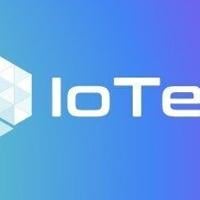
2 months ago
IoTeX Welcomes Xangle as Validator to Boost DePIN Ecosystem
IoTeX, a prominent player in the Decentralized Physical Infrastructure Network (DePIN) sector, has recently announced that Xangle, a leading blockchain infrastructure company from Korea, will join its network as a validator. This partnership is expected to enhance IoTeX's community-driven ecosystem and improve its technical stability. Xangle, known for its ecosystem-oriented community hubs and Web3 analytical reports, has been a significant contributor to the Web3 space since launching Xangle Portal in 2018, and has also validated for other major blockchain projects like Aptos and Babylon.
In 2024, IoTeX has emerged as a leader in the DePIN sector, processing over 150 million transactions and 340 million blocks, with an impressive annual growth rate exceeding 25%. Currently, more than 360 million IOTX tokens are staked, representing about 40% of the total supply, which significantly bolsters the network's security and governance. This growth underscores IoTeX's commitment to providing robust infrastructure solutions within the DePIN landscape, solidifying its position as a key player in the industry.
Lihan Lee, Co-CEO of Xangle, emphasized that their role as an IoTeX validator is a pivotal step towards making innovative Web3 infrastructures more accessible and promoting their mainstream adoption. Jing Sun, co-founder of IoTeX, echoed this sentiment, highlighting that Xangle's expertise will enhance the network's credibility and stability. Together, they aim to drive the sustainable growth of the DePIN ecosystem, ensuring that IoTeX remains at the forefront of blockchain infrastructure development.
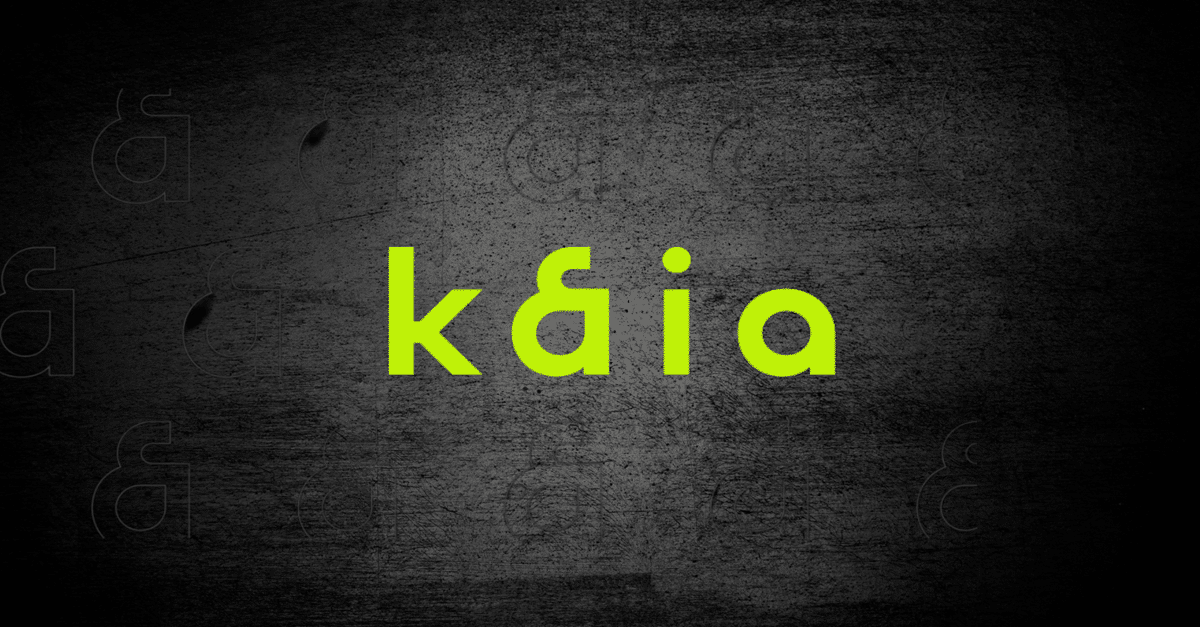
2 months ago
Crypto Market Update: Theta's New Partnership and Emerging Investment Opportunities
The global cryptocurrency market is currently valued at $2.69 trillion, reflecting a modest increase of 1.20% over the past day. However, trading volume has seen a significant decline of 23.50%, dropping to $119.79 billion, indicating a slowdown in short-term trading activity. Despite this downturn, many investors are seizing the opportunity to buy the dip, fueled by optimism surrounding recent market developments and evolving policies. Notably, cryptocurrencies like Gala (GALA), Immutable (IMX), and Kaia (KAIA) are emerging as strong investment candidates, showcasing resilience and potential for growth in this fluctuating market.
Theta Network has recently made headlines with its partnership with Nubila, a decentralized physical infrastructure network focused on gathering real-world weather data. This collaboration will leverage Theta's EdgeCloud GPU resources for training AI models, marking a significant expansion beyond its original video streaming focus. Currently, Theta's token (THETA) is trading at $0.87, with a market cap of $759.25 million. Analysts are optimistic, predicting a potential price increase of 22.48% by April, as the platform continues to evolve its offerings in the Web3 space.
In addition to Theta, the Meme Index (MEMEX) has gained traction by offering a diversified investment approach to meme coins, raising over $3.9 million in its presale. Meanwhile, Kaia DLT Foundation is making strides in the blockchain ecosystem with its Mini Dapps, attracting over 35 million users in just a month. As these projects develop, they highlight the dynamic nature of the crypto market, where innovative solutions and strategic partnerships are paving the way for future growth and investment opportunities.
Signup for latest DePIN news and updates